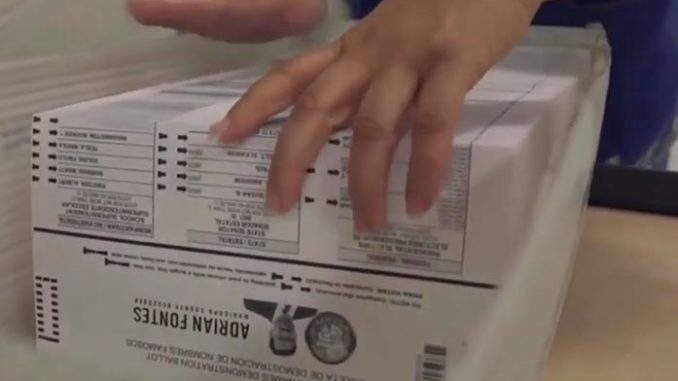
Legislation which has the potential to ensure tens of thousands of early ballots are not mailed out to voters who have no intention of using them was signed Tuesday by Gov. Doug Ducey, just a short time after it passed the Senate.
SB1485 was approved in the morning by the Senate on a 16 to 14 vote and then transmitted to the governor’s office. It was expected that Ducey would be lobbied from all sides about whether or not to sign the legislation which only affects voters on what was the Permanent Early Voter List (PEVL) and is now the Early Voting List (EVL) who do not vote in at least one election in four years.
However, the governor appeared to surprise everyone by releasing a video showing him signing the bill, which is considered by many election followers to be one of the state’s most impactful election integrity legislation in years. He also pushed back on suggestions that supporters of the SB1485 were somehow trying to make it harder for minorities to vote.
“Let’s be clear, despite all the deceptive and heated rhetoric being used by some partisan activists to lobby against this reform, not a single Arizona voter will lose their right to vote as a result of this new law,” Ducey stated in a video his office released to announce the bill sponsored by Sen. Michelle Ugenti-Rita had been signed.
Under the new legislation, a voter would be flagged for possible removal from the EVL if they do not vote in any one of four consecutive statewide elections, which includes a primary and general election every two years. A voter who only cast a ballot in a city or local special election during that same period would be treated as having met the criteria to remain on the EVL.
No one will be removed from the EVL despite their lack of voting history unless they also fail to respond to an inquiry from their local county recorder’s office about their desire to remain on the early ballot list. And being on EVL or not makes no difference to a voter’s actual voter registration file or their right to vote in-person.
SB1485 was presented by some as a cost-savings method so counties could print and mail fewer ballots. The main objective, however, was to ensure unwanted early ballots are not mailed out to voters who no longer utilize the option.
As an example, more than 30,000 early ballots were never used nor returned by the postal service in Maricopa County’s 2020 General Election.
Initial reports showed nearly 207,000 voters across Arizona had not voted in at least one of the last four statewide elections through 2020. The bill was later amended to allow a voter’s participation in a city or special local election to be considered, reducing the number of long-term EVL non-users in the state to about 170,000.
“Standing with the voters and their desire for secure elections is paramount to maintaining our form of government,” Ugenti-Rita later tweeted. “This bill is a modest, but critical step toward restoring confidence in our election system.”
Ducey also pushed back in his comments when signing SB1485 about large corporations expressing opinions about Arizona’s voting laws.
“Arizona has for years continuously improved and refined our election laws, including intuitively renaming ‘absentee’ voting to ‘early’ voting, and constantly seeking to strengthen the security and integrity of our elections,” he said. “These big businesses have seemed to embrace a static view of elections.”
